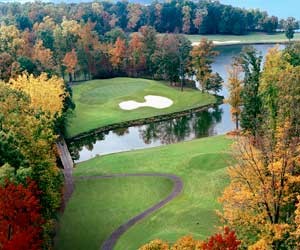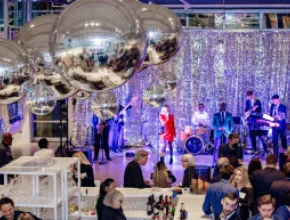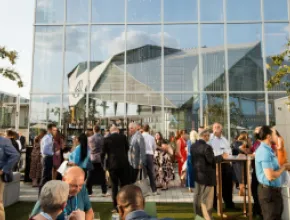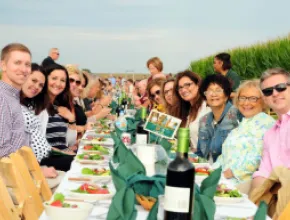The Three Stooges. The Supremes. The Star Wars Trilogy (until they added three more, anyway). It’s no secret that good things come in threes, especially when they complement each other. For planners, the ability to mix and match between the trio of cities that form North Carolina’s Triad (Greensboro, Winston-Salem and High Point) equates to a tremendous amount of flexibility in a part of the Southeast that is as historically rich as it is affordable.
Due to its location in central North Carolina—and for being in the crossroads of four major interstate highways—Triad has long been a key transportation and manufacturing hub. But the region was also an integral part of the civil rights movement, and its whopping 20 higher educational institutions help to give it an artistic and energetic presence.
While each city is less than a half-hour drive from one another, they boast unique differences.
Winston-Salem is considered an arts mecca of the Southeast, with numerous museums and galleries, and it also boasts a fascinating history, particularly in the Old Salem district.
Greensboro also claims an important slice of history, as the epicenter of the sit-in protests during the civil rights movement. The city has also been ranked as an ideal home for businesses and for its high quality of living.
High Point is primarily known as the "Furniture Capital of the World." With its High Point Market, drawing 2,300 international furniture exhibiters, the city has plenty of experience hosting large events.
Easily accessed by the nearby Piedmont Triad International Airport, this three-cities-in-one destination is an ideal meetings choice.
Greensboro
Historically celebrated for its active role in the civil rights movement, Greensboro quickly became famous in February 1960, when four black college students sat down at an all-white lunch counter and refused to leave. This dispute eventually led to the national sit-in protests and the desegregation of several chain stores.
Today, Greensboro is recognized as an ideal place to run a business, as well as one of the best places to live. In fact, in 2004 the Department of Energy awarded Greensboro with entry into the Clean Cities Hall of Fame.
When it comes to meetings, Greensboro shines for its considerable infrastructure, which includes 9,500 guest rooms, a modern convention center with a 1,000-room adjoining hotel, several theaters and auditoriums and ample parking.
"With our tier-one meeting venues, plus a great variety of attractions, golf courses and entertainment sites, Greensboro is the best part of the state to visit," says Gail Murphy, director of marketing and communications of the Greensboro Area CVB.
The focal point for large meetings is the 1,000-room Sheraton Greensboro Hotel at Four Seasons and the adjoining Joseph F. Koury Convention Center. Together, they provide 250,000 square feet of meeting space, including a 40,000-square-foot ballroom. The complex also offers 2,200 free parking spaces. A mile away sits the Greensboro Coliseum Complex, seating 23,500 in its arena, as well as the adjacent 2,400-seat War Memorial Auditorium, 300-seat Odeon Theater, a 120,000-square-foot Special Events Center and a 30,000-square-foot pavilion.
A must-see for visiting groups and an excellent off-site venue is the brand-new International Civil Rights Center and Museum, opening Feb. 1, 2010, the 50th anniversary of the national sit-in movement. Within three blocks visitors will also find the Greensboro Historical Museum, several art galleries, Center City Park and more than 60 restaurants and bars. Nearby, the Guilford Courthouse National Military Park has more than 220 acres of walking trails and historic monuments. Just next door is the Natural Science Center, with its new Animal Discovery Zoological Park.
Winston-Salem
Winston-Salem is a natural choice for groups keen on American history. Old Salem dates back to 1753, when the area was settled by members of the Moravian Church, and many of the original buildings from this era have been restored or rebuilt. In Historic Bethabara Park, costumed guides lead groups on narrative walks through the grounds, which include a fully furnished church built in 1788.
More modern options can be found in the West End Historic District, with a blend of historical authenticity and modern shopping and dining. Throughout the years this neighborhood has been home to some of the richest families in America (from the tobacco and textile industries), and today it is an excellent destination for an upscale dinner or simply admiring the immense variety of front-porch-styled homes.
Winston-Salem’s arts scene is another highlight that should not be missed. The city had the first arts council in the U.S., founded in 1949, and today is home to a wide assortment of art schools, galleries, music festivals and museums. For groups, planners can consider the Diggs Museum (one of North Carolina’s largest displays of African art); the Downtown Arts District (full of working studios and small galleries, in addition to great dining, and only a block from Benton Convention Center); Delta Arts Center (hosting performances, lectures and exhibitions, particularly in celebration of African-American contributions to the arts); and the Reynolda House Museum of American Art (featuring collections of art from colonial periods).
Aside from entertaining visitors with art and history, Winston-Salem is equally prepared for meetings.
"Planners are pleasantly surprised by the affordable artist palette of off-site venues that are easily accessible to group events," says Stephan Dragisic, director of marketing and communications of Visit Winston-Salem. "In many larger cities, venue costs and transportation can be way out of line; in smaller cities the venue offerings can be nonexistent. Winston-Salem offers the best balance, price, accessibility and multiple choices."
For large events, Benton Convention Center is located downtown and is connected to both the Embassy Suites Winston-Salem and the Winston-Salem Marriott. Combined, this equates to 160,000 square feet of meeting space. Additionally, the Lawrence Joel Veterans Memorial Coliseum complex offers 91,000 square feet of meeting space, while the Winston-Salem Sports-Entertainment Complex provides two large exhibition spaces, a 5,600-seat theater, in-house catering and a number of smaller meeting rooms. For meetings that don’t require this much space, the city boasts a wide range of interesting off-site venues, from museums and art galleries to university facilities.
High Point
High Point is famous for something completely different—household furniture. Of course, there are dozens of cities and towns that might stake a claim to producing either the most or the highest quality furniture in their particular state, but High Point is regularly dubbed the "Furniture Capital of the World." And because High Point hosts the semi-annual High Point Market—encompassing up to 12,000,000 square feet of showroom space among 188 separate buildings and featuring 2,300 exhibitors—you could say that this city has some experience hosting large events.
"High Point’s furniture manufacturing heritage and its outstanding Southern charm, with universal appeal, accessibility, affordability and credibility, makes this city stand out from the other Triad cities," says Marva Wells, sales manager of the High Point CVB.
Showplace, the city’s largest venue, at 450,000 square feet, is a visually stunning and modern building with a 100-foot-high atrium and five floors. It offers 78,000 square feet of convention and trade show floor space. Next in line, the historic Centennial Station can host groups of up to 500 with its 8,000 square feet of meeting space. Lastly, there is The Suites at Market Square, with a total of 110,000 square feet of flexible meeting space.
Planners looking for an unusual activity to make an impression on attendees, and possibly a memorable team-building activity, put their navigating skills to the test at Maize Adventure, a 10-acre cornfield maze. For more traditional pursuits, High Point offers four public and two private golf courses, as well as a Shakespeare festival and summer concert series.
—Hunter Holcombe is a freelance writer who covers leisure travel and the meetings, conventions and incentives industry.






